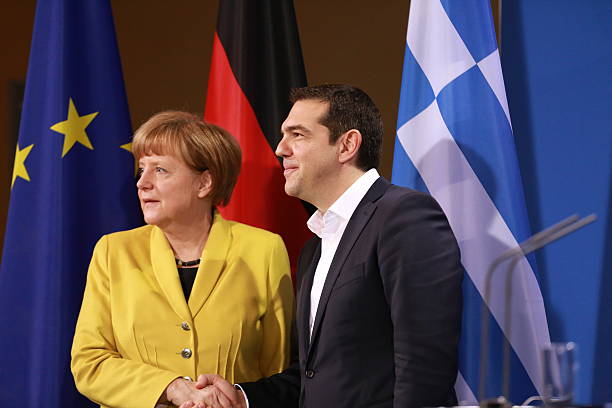Greece will hold a snap election on 7 July. Zoe Alipranti writes that it is widely expected New Democracy will finish in first place ahead of Syriza, as occurred at the recent European elections. She explains that although greater political stability might be entrenched in the short-term, the next government will be tasked with trying to revive the Greek economy while navigating the poisonous divisions that were sown during the crisis years.
Zoe Alipranti works on EU politics at Open Europe, a non-partisan independent think tank.
Cross-posted from LSE EUROPP

Greek politics has strayed from European trends – there has been no recent rise of new liberal challenger parties or right-wing Eurosceptic forces. Two parties which are on the extremes of the political spectrum and still command some support are the Communist Party (KKE), which received 5.3% of the vote in the European elections, slightly down from its 2014 result; and the Neo-Nazi party Golden Dawn, which saw its support almost halve to 5%.
Golden Dawn’s result did not represent an overall decrease of the far-right vote, since another party called Greek Solution filled the gap and elected one MEP. The party is a populist right-wing, anti-immigration and pro-Russian group led by Kyriakos Velopoulos. Velopoulos recently advocated the death sentence for people smugglers to stop the flow of migrants to Greece and the construction of a wall on Greece’s border with Turkey, as well as laying mines next to it.
One can claim that the anger and frustration that propelled the far-right in Greece during the crisis is dissipating. But the success of Greek Solution can be explained by the party’s vehement opposition to the Prespa agreement. It can also be traced to the presence of an ultraconservative vote that has been present in Greek politics for the past decades, first through LAOS which Velopoulos was a member of, then through the Independent Greeks and now through Greek Solution.
Both the ultraconservative Independent Greeks (ANEL) and the centrist party The River (To Potami), whose popularity was boosted during the peak of the crisis, lost their seats in the European elections and have fallen into obscurity. MERA 25, the party founded by Yanis Varoufakis, hovered around the 3% threshold but in the end failed to secure an MEP.
What kind of parliament will the national elections produce?
The European dimension was largely absent from this year’s elections in Greece, contrasting with other countries such as France and Germany. This might suggest the result on 7 July will have some degree of convergence with the result of the European elections.
There might nevertheless be some differences. For instance, the dynamics of the far-right camp might well change and KINAL numbers might rise if voters are less willing to cast protest votes in the national elections. Around 21% of the vote in the European elections went to parties that failed to elect MEPs; national elections might imply different calculations from voters, thus adding a layer of unpredictability to the result. As ever, turnout will also be critical.
A recent Metron analysis poll indicated that voting intentions largely coincide with the result of the European elections, with New Democracy leading with 31%, Syriza at 23% and KINAL at 6%. A separate poll carried out by Pulse for broadcaster SKAI estimates the New Democracy vote will be between 31 and 36%, Syriza between 22.5 to 27.5%, and KINAL between 6.5 to 9%. The Communist Party was fourth with 4.5 to 6.5%, Golden Dawn following on 4 to 6% and the nationalist Greek Solution between 3 and 5%.
What will the future government look like? The first scenario is New Democracy forming a government after achieving the necessary percentage to enter office without a coalition partner. The second scenario would be New Democracy winning the elections, but needing to partner with a smaller party to form a coalition government. Most small parties that will get more than the 3% threshold seem unsuited for a coalition, with the exception of KINAL.
The Greek economy remains fragile and has not recovered to its pre-2009 levels. Unemployment has decreased but remains higher than pre-crisis levels, vulnerabilities in the banking sector persist and a ‘brain drain’ is exacerbating the demographic problems that are plaguing many western societies. Though the next Greek government will have the opportunity to improve the economy, as a recent European Commission report pointed out, “downside risks dominate the forecast in the short and medium term.”
Populist tactics and extremist rhetoric ushered in during the crisis seem to be on the wane, but populism and clientelism are now deeply embedded in the Greek political system. The long-term shift that has occurred in Greek politics is illustrated by the electoral results of the last decade. In 2009, PASOK won a landslide victory with 43.9% but by 2015 was reduced to a mere 4.7%. Syriza was at 4.6% in 2009, before reaching 36.3% in 2015. The New Democracy vote share has oscillated from 33.5% in 2009 to 18.9% in 2012 and it is now set to win the election with more than 30%.
Greater political stability might be entrenched in the short-term, but the next government has a long road ahead in a country hit hard by the crisis and the poisonous divisions that were sown during recent years. It cannot afford to replicate past mistakes.


Be the first to comment